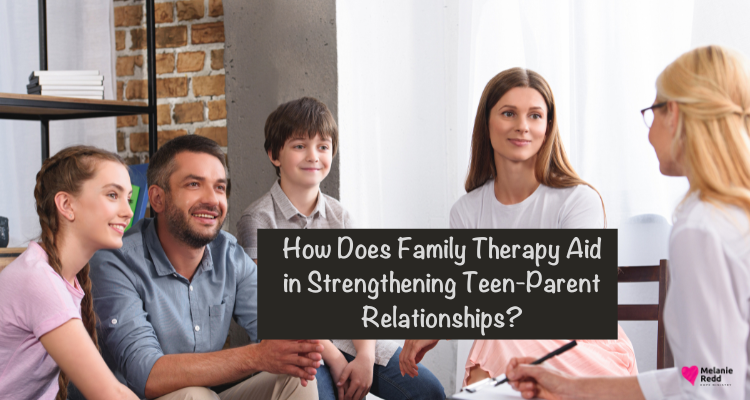How Does Family Therapy Aid in Strengthening Teen-Parent Relationships?

How Does Family Therapy Aid in Strengthening Teen-Parent Relationships?
Understanding the dynamics between teenagers and their parents can often seem like deciphering a complex puzzle. As teens navigate through their formative years, the relationship with their parents can sometimes become strained due to communication gaps, misunderstandings, and evolving personal identities.
Truly, family therapy has emerged as a pivotal approach to bridging these gaps and fostering a stronger, more understanding relationship between teens and their parents. Utilizing the expertise of family therapists, this therapeutic approach aims to resolve conflicts and introduce positive interaction patterns within families.
In this blog, we will share insights on how structured guidance from a professional can create a harmonious home environment, enhancing the overall family dynamic.
The Importance of Family Therapy
First, family therapy provides a structured environment where family members can openly express their thoughts and emotions. This therapeutic practice is essential, especially in households where communication breakdowns are frequent. Therapists facilitate discussions that aim to reduce family conflicts and increase understanding among members.
By addressing issues collectively, family therapy helps in identifying the roots of misunderstandings and miscommunications, allowing each member to see beyond their perspective. It’s not just about solving problems but also about learning how to interact in more positive and constructive ways.
For families with teens, this can be particularly beneficial as it supports the teen’s developmental needs while ensuring that parents feel involved and connected to their children’s lives.
Role of Licensed Clinical Social Workers (LCSW)
Second, Licensed Clinical Social Workers (LCSW) are often at the forefront of delivering family therapy. They undergo rigorous training, often through convenient accredited LCSW online programs, equipping them with the necessary skills to handle complex family dynamics.
In therapy, LCSWs use a variety of techniques to mediate conversations and guide families toward healthier relationships. They are trained to spot behavioral patterns and emotional responses that might go unnoticed by families themselves but are key when it comes to understanding the underlying issues.
Even more, the therapeutic process led by LCSWs helps in resolving existing conflicts. Also, it empowers families with tools to handle future challenges more effectively, thereby maintaining a healthier long-term relationship.
Communication Strategies in Family Therapy
Third, improving communication is a fundamental goal of family therapy. Therapists work with families to develop new ways of talking and listening to each other. Techniques such as “active listening” and “I statements” are often taught, which help in expressing one’s thoughts and feelings without causing defensiveness in others.
For example, instead of accusing each other during disagreements, family members learn to discuss their feelings by saying things like, “I feel upset when…”
Indeed, this approach helps reduce conflicts and increases mutual respect among family members. Over time, these new communication skills can transform the way family members interact daily, fostering a more open and supportive environment.
Understanding Teenage Development
Fourth, a significant part of strengthening teen-parent relationships is understanding the emotional and psychological development of teenagers. Family therapy often includes sessions that educate parents about the stages of teenage development, helping them to adjust their expectations and methods of interaction accordingly.
Moreover, recognizing that certain behaviors are a normal part of teenage growth can help parents feel less anxious and more patient when dealing with their children.
Additionally, when teens see that their parents are making an effort to understand them, it can lead to a greater willingness to open up and share their own experiences and challenges.
Conflict Resolution Techniques
Fifth, conflict is inevitable in any relationship, but in the parent-teen dynamic, it can often escalate quickly due to emotional volatility and misunderstandings. Family therapy introduces specific conflict resolution techniques that teach both parents and teens how to handle disputes constructively.
Even more, this includes learning to take timeouts when emotions run high, discussing issues calmly, and finding compromise solutions that respect everyone’s needs. These techniques are invaluable because they prevent conflicts from worsening, promoting a calmer household where problems can be discussed and resolved without resentment.
The Role of Empathy in Healing Relationships
Sixth, empathy is the foundation of effective family therapy. It allows each member to genuinely understand and share the feelings of others, fostering a deeper connection and reducing conflicts.
During therapy sessions, therapists emphasize the importance of empathy in everyday interactions, encouraging family members to consider each other’s viewpoints before reacting.
Truly, this understanding can drastically alter the family dynamic, reducing the frequency and intensity of disagreements. When parents and teens learn to empathize with each other’s struggles and victories, it nurtures trust and mutual respect, which are vital for a healthy relationship.
Setting Boundaries and Limits
Next, setting clear and fair boundaries is extremely important in any family, especially those with teenagers. Family therapy sessions often focus on establishing these boundaries, which helps maintain respect and privacy while ensuring that each family member feels valued and understood.
In addition, therapists guide families in negotiating rules that are acceptable to both parents and teens, facilitating a sense of ownership and responsibility in teenagers. Clear boundaries help prevent conflicts by defining what is expected from everyone, making it easier for family members to coexist peacefully and be supportive.
The Impact of Family Therapy on Parental Guidance
Seventh, family therapy not only aids teens but also significantly influences parental behaviors and techniques. Through sessions, parents receive feedback and insights on how their actions and decisions affect their children, allowing them to adapt their parenting styles to better meet their teens’ needs.
Also, this segment of therapy focuses on educating parents about effective leadership within the family, teaching them to balance firmness with kindness. The outcome is a more effective parenting approach that supports the teen’s emotional and psychological development while maintaining the parents’ authority and respect.
Long-Term Benefits of Family Therapy
Finally, the benefits of family therapy extend well beyond the resolution of immediate issues. Families that engage in therapy typically experience sustained improvements in communication and understanding that last many years.
Indeed, this ongoing enhancement in family dynamics can lead to a more supportive and cohesive home environment, where each member feels more connected and valued. Long-term, these benefits contribute to better
mental and emotional health for all involved, particularly during the challenging teen years.
Closing Thoughts
All in all, family therapy offers a powerful tool for strengthening the bond between teen parents and their families.
By providing a safe space for open communication, understanding, and support, therapy can help heal past wounds, build trust, and create a stronger foundation for the future.
Also, it’s about equipping everyone involved with the skills to navigate the challenges of teen parenthood together, fostering a sense of unity and shared responsibility. Remember, a strong family unit can significantly impact a teen parent’s journey, providing them with the love, encouragement, and practical support they need to
thrive.
Were you encouraged by what you read?
Then, would you share this article with a friend, co-worker, or family member?
Or, maybe you can send it to a friend or family member?
This blog occasionally uses affiliate links and may contain affiliate links.
Additionally, Melanie Redd is a participant in the Amazon Services LLC Associates Program.
This is an affiliate advertising program designed to provide a means for sites to earn advertising fees. These are earned by advertising and linking to amazon.com.
Also, for more on my disclosure policy, click HERE.
© Melanie Redd and Hope Ministry, 2024. Unauthorized use and/or duplication of this material without express and written permission from this blog’s author and/or owner is strictly prohibited.
Further, excerpts and links may be used, provided that full and clear credit is given to Melanie Redd and Hope Ministry.
Please give appropriate and specific directions to the original content.




0 Comments